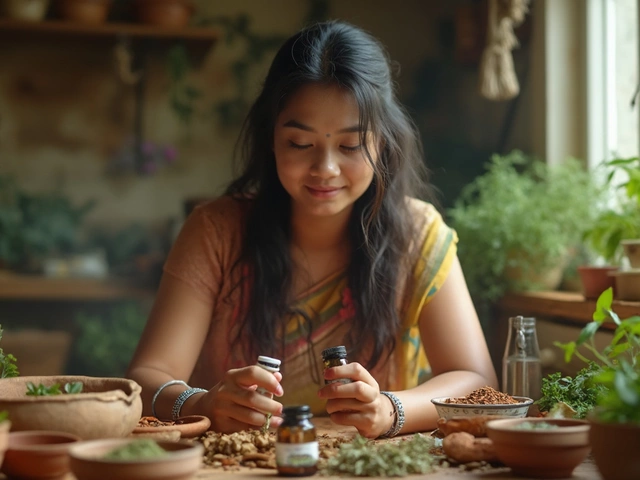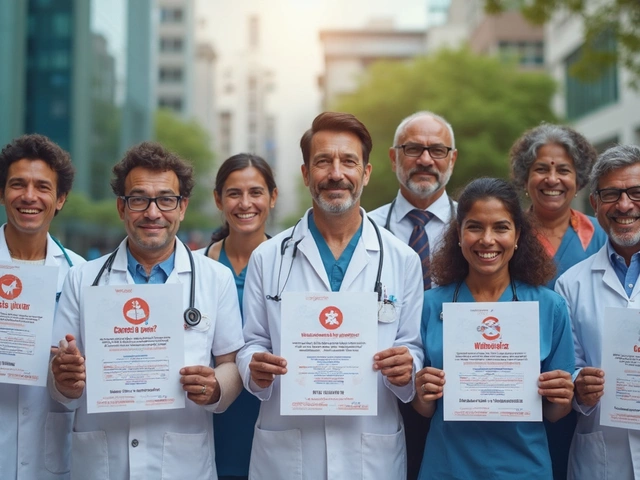Not everyone can just walk into a clinic and start IVF. It might sound unfair, but there are some clear-cut rules about who can and can't get this treatment. The most obvious reason? Age. Many clinics get strict once a woman is in her mid-40s, even if she feels fit and energetic. Ovarian reserve—the number of eggs left—matters just as much; if the numbers are low, doctors might say IVF just won’t work.
Then you’ve got stuff like certain chronic illnesses or untreated medical problems. These can cut your chances before you even start. And it’s not just about blood tests—sometimes, things like advanced heart disease or active cancer make IVF too risky. Nobody’s trying to judge, but clinics have rules to keep you safe, even if it means giving you disappointing news.
- Age and Ovarian Reserve Limits
- Medical Conditions That Exclude You
- Lifestyle and Legal Barriers
- Common Myths About IVF Ineligibility
- Tips If You’re Not Eligible
Age and Ovarian Reserve Limits
This part always catches people off guard. Age isn’t just a number when it comes to IVF—most clinics set a hard cutoff somewhere around 43 to 45 years old for women using their own eggs. Some places won’t go past 42. It’s not because clinics want to be tough; it’s because the chance of success drops off a cliff after that, especially with natural eggs. Live birth rates in this group are usually below 5% per cycle, even with the latest techniques.
Ovarian reserve is the other biggie. This is basically how many eggs you’ve got left, and it’s often checked using a simple AMH blood test or an ultrasound to count follicles. If your AMH is super low (like under 0.5 ng/mL) or the doctor sees only a couple of small follicles, they’ll probably say IVF just isn’t worth putting you through. At that point, donor eggs might be the only realistic option if you want to keep going.
Here’s a quick rundown on what usually makes doctors draw the line:
- Age above 43-45 years (for own-egg cycles)
- Very low AMH or antral follicle count
- Repeated failed ovarian stimulation with hardly any eggs retrieved
Remember, all this applies mostly to women using their own eggs. If you’re considering donor eggs or embryos, the upper age limit gets a bit more flexible, but most doctors will still keep things below age 50 for safety.
Even guys aren’t always in the clear. Extremely low or zero sperm counts will rule out classic IVF and might push you toward options like donor sperm or advanced surgical retrieval.
IVF clinics aren’t trying to be mean—they want you to have a real shot. Chasing cycles when the odds just don’t add up usually leads to more heartbreak and empty wallets than happy endings.
Medical Conditions That Exclude You
This is where things get real: some health issues just don’t mix well with IVF. If you think this is just about the occasional cold, think again. Clinics have a running list of specific problems that make IVF unsafe or just plain impossible. And these aren’t one-off rules; most centers worldwide follow similar guidelines, all to protect your health and the chances of a good outcome.
Here are the heavy hitters that usually stop IVF in its tracks:
- Uncontrolled diabetes: High blood sugar messes with both implantation and pregnancy, so clinics usually won’t proceed if your diabetes isn’t well-managed.
- Severe heart or lung diseases: If your heart or lungs can’t handle a pregnancy, IVF is considered too risky.
- Certain cancers: If you’re currently being treated for cancer, or if your cancer is hormone-sensitive, you’ll usually have to wait or might be told it’s not safe.
- Untreated infections: Active hepatitis B or C, HIV (in some clinics), and tuberculosis are often showstoppers until well-controlled.
- Uncontrolled thyroid disorders: These can throw your periods and hormones out of sync, making IVF pointless until treated.
- Structural problems: Serious issues with the uterus—like scarring, big fibroids inside the cavity, or certain congenital defects—can mean embryos just won’t stick.
Here's how often these issues crop up, based on recent clinic records:
| Condition | Percent of IVF Patients Affected |
|---|---|
| Uncontrolled diabetes | 2-5% |
| Active cancer treatment | 1-2% |
| Severe heart/lung disease | <1% |
| Untreated infections | 3-7% |
| Major uterine problems | 4-8% |
Even if your health issue isn’t listed here, clinics will check every detail, including your medical and surgical history. Sometimes, you’ll need extra screening—like a heart check-up or bloodwork—before they give a green light for IVF. If you have one of these conditions but it’s well controlled, don’t lose hope. There are cases where clinics make exceptions, so it’s always worth asking for a thorough review.

Lifestyle and Legal Barriers
It's not just your health or age that can keep you from IVF. Sometimes, the way you live your life or even where you live can stand in your way. Clinics will ask questions about things like smoking or heavy drinking because these habits can wreck your chances of a healthy pregnancy. Most clinics want you to quit smoking before you even start. According to the CDC, women who smoke are less likely to get pregnant with IVF and face higher risks of miscarriage.
If you have a BMI over 35, a lot of programs will put IVF on hold until you bring your weight down. It sounds harsh, but research shows IVF success drops as BMI climbs. What about illegal drug use? That's a total non-starter. If someone tests positive for drugs, clinics won’t go ahead, period.
IVF rules also vary a lot by country and state. For example, some countries only allow married couples to get treatment. In India, single women and same-sex couples still face patchy access, partly thanks to 2022 laws. Some states in the US require you to be married or set limits on embryo freezing. Even things like age and how many times you can try IVF get capped by national or local laws. Here’s what some of these barriers look like:
- Mandatory HIV, Hepatitis, and STD screening for both partners before IVF.
- Legal age: Under 21 or over 50? Many places just say no.
- Proof of a stable home life or relationship in some countries.
- Same-sex couples and single women facing tougher restrictions in many regions.
| Barrier | Common Outcome |
|---|---|
| Smoking | Treatment delayed until quitting |
| BMI over 35 | IVF denied or delayed |
| Illegal drug use | Automatic disqualification |
| Legal restrictions (country/state) | Eligibility based on marital status, age, sexual orientation |
As Dr. Kirsten Black from the University of Sydney puts it,
“Access to fertility treatment can be heavily influenced by lifestyle choices and legal frameworks, not just medical need.”
So if you’re thinking about IVF, it helps to check not only the doctor's checklist, but also your country or state’s rules. Small changes to your habits and paperwork can make the difference between being turned away or being able to start.
Common Myths About IVF Ineligibility
There’s a bunch of outdated info floating around about who can’t have IVF. A lot of it just isn’t true anymore, thanks to medical advances. If you’re worried you might not qualify, it’s time to separate what’s real from what’s just talk.
- IVF is only for young women. Not true. While age affects success rates, many women in their 40s do IVF, especially with donor eggs. Some clinics treat women up to age 50.
- Women with low AMH (anti-müllerian hormone) have no shot. Actually, low AMH means fewer eggs, not that you’re totally out. Some women with low numbers still get pregnant with IVF.
- Being overweight means you can’t do IVF. It’s complicated, but you’re not automatically disqualified. Many clinics treat women with higher BMIs, though they may recommend weight loss to boost safety and success.
- Men with low sperm count can’t become fathers through IVF. Not true! Even men with very low counts, or no sperm in their semen, can sometimes father children using advanced techniques like ICSI (where a single sperm is injected into an egg).
- If you’ve had cancer, forget IVF. Depending on the type and status of cancer, some survivors do IVF—often using eggs or sperm frozen before treatment.
Check out some stats showing how these myths don’t always line up with reality:
| Belief | Actual Fact |
|---|---|
| Women over 40 can’t have IVF | 21% of US IVF cycles in 2022 were for women aged 40-44, with thousands of births |
| Low sperm count rules out IVF | ICSI has helped men with fewer than 1 million sperm/ml achieve pregnancies |
| High BMI blocks IVF | Many clinics accept BMIs up to 40, and some even higher on a case-by-case basis |
If something you’ve heard puts you off IVF, check with a clinic first. Most clinics want to give you honest answers, not just turn people away because of old rules.

Tips If You’re Not Eligible
Getting told you’re not eligible for IVF can feel like a punch in the gut. But honestly, there are still some real steps you can take if the answer is no for now or maybe forever. It isn’t the end of your journey—just a detour.
First, make sure you understand exactly why you were turned down. Sometimes the reason is medical, and sometimes it’s based on clinic policy. Ask for your full results and a written explanation. Bringing these when you get a second opinion saves time and avoids repeat tests.
If a health issue is the problem—like untreated thyroid issues or high blood pressure—work closely with your doctor to get it under control. Some people are only temporarily ineligible for IVF and can reapply in a year or two.
Consider these other options:
- Other fertility treatments: Sometimes less invasive options like ovulation induction, IUI (intrauterine insemination), or donor eggs/sperm might still be possible, depending on your exact situation.
- Adoption or surrogacy: These are absolutely real family-building paths for many people. Surrogacy is popular when carrying a pregnancy is risky or impossible.
- Counseling and support: Infertility can wreck your mental health. Talking to a psychologist, support group, or even a fertility coach is more helpful than most folks expect.
Don’t fall for miracle treatments or shady clinics claiming they can get around medical limits. If something sounds too good to be true, it probably is. Always check that clinics are certified and follow ethical standards.
Finally, keep talking to your partner, friends, or folks who get it. Building a support network can make all the difference when the path you wanted isn’t open right now.



